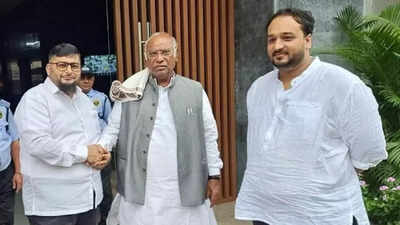


Dr. Abraham Mathai, a former Vice-Chairman of Maharashtra State Minorities Commission, has written to the President of the United Nations Human Rights Council (UNHRC) to intervene and secure the release of jailed Iranian Nobel Peace Prize Laureate, Ms. Narges Mohammadi, on humanitarian grounds. Mohammadi, who has been imprisoned by Iran for 10 years, is in a precarious state of health and urgently needs comprehensive medical treatment. Ahead of Iran's review under the UN Human Rights Council's Universal Periodic Review, Mathai is urging UNHRC to compel the Iranian authorities to release Mohammadi so she can receive proper care for her serious medical conditions.
Iranian Nobel Peace Prize Laureate Narges Mohammadi Languishes in Prison, Faces Grave Health Risks
Dr. Abraham Mathai, a former Vice-Chairman of Maharashtra State Minorities Commission, has penned an urgent letter to the President of the United Nations Human Rights Council (UNHRC), appealing for intervention to secure the release of Iranian Nobel Peace Prize Laureate, Ms. Narges Mohammadi, on humanitarian grounds.
Background:
Narges Mohammadi, a prominent human rights defender, has been imprisoned in Iran since 2015. She has been subjected to severe torture and ill-treatment during her time behind bars, resulting in serious health issues. In October 2022, she was sentenced to an additional 10 years in prison on charges of "propaganda against the state."
Health Concerns:
Mohammadi is currently in a precarious state of health, suffering from seizures, heart problems, and severe migraines. She desperately requires comprehensive medical treatment that is unavailable in the prison environment. Her condition has deteriorated in recent months, and her family fears for her life.
International Appeal:
Dr. Mathai's letter to the UNHRC highlights the urgency of Mohammadi's situation and urges the Council to intervene to secure her release. He stresses that Iran is violating its obligations under international law by denying Mohammadi adequate medical care and that her continued imprisonment is a violation of human rights.
Ahead of Iran's UNHRC Review:
Mathai's appeal comes ahead of Iran's review under the UNHRC's Universal Periodic Review (UPR), a mechanism that assesses countries' human rights records. He urges the UNHRC to compel Iran to release Mohammadi so that she can receive the medical attention she urgently requires.
Top 5 FAQs:
1. Why is Narges Mohammadi in prison? She is imprisoned on charges of "propaganda against the state" for advocating for human rights and civil liberties.
2. What is the current state of her health? She is suffering from severe seizures, heart problems, and migraines. Her condition has deteriorated significantly in recent months.
3. What is the role of the UNHRC in this case? The UNHRC is being urged to intervene and secure Mohammadi's release on humanitarian grounds.
4. What is the Universal Periodic Review (UPR)? It is a UNHRC mechanism that reviews countries' human rights records.
5. What action is Dr. Abraham Mathai taking? He has written a letter to the President of the UNHRC, appealing for intervention to secure Mohammadi's release.

In a tense meeting at the White House, President Donald Trump urged Ukrainian President Volodymyr Zelensky to accept Russian President Vladimir Putin's terms for ending the two-year war in Ukraine. Despite seeking more military support from the US, Zelensky was met with resistance from Trump, who reportedly engaged in a "screaming match" with the Ukrainian leader. The US leader even claimed that Putin saw the conflict as a "special operation" rather than a full-fledged war, further complicating negotiations between the two nations.

As Liverpool struggled to find their form in a tough game against Manchester United, Dutch midfielder Cody Gakpo stood out with his sharp attack and strong composure. Despite hitting the woodwork three times, Gakpo managed to score a brilliant equalizer for his team, showcasing his potential and talent on the field. While Liverpool may have lost the match, Gakpo's impressive performance provided a glimmer of hope for a struggling team.

Ayodhya's Deepotsav 2025 was a shining example of faith, community, and innovation as the city set two new world records with over 26 lakh diyas and a grand aarti performed by 2,100 priests. The event, witnessed by Chief Minister Yogi Adityanath, also showcased a spectacular 3D projection mapping and drone light show that brought Lord Ram's story to life in the night sky. The event was a testament to the deep connection Ayodhya's youth have with Lord Ram's ideals and was made possible by the hard work of over 40 potter families and thousands of volunteers.

In a brazen and perfectly orchestrated robbery, a group of thieves infiltrated the world-famous Louvre Museum in Paris on Sunday morning and made off with a collection of priceless jewels with an estimated value in the millions. French officials confirmed the robbery and began a detailed investigation to determine how the culprits managed to evade the museum's advanced security systems and execute the crime in under seven minutes. This latest incident has raised serious concerns about the protection of national treasures at one of the world's most popular tourist destinations.

In an audacious heist, a group of armed thieves breached security at the iconic Louvre Museum in Paris and stole nine valuable jewels from the collection of Napoleon Bonaparte and Empress Joséphine. The robbery, which took place in just seven minutes, has prompted a full-scale police investigation and raised concerns about the museum's security. French officials are working to recover the stolen items, but the Louvre remains closed to visitors.

Despite a ceasefire in early October, the conflict between Israel and Palestine shows no signs of abating, with reports of ongoing deadly clashes and Israeli tank fire targeting a car in Gaza City. The closure of the Rafah border crossing to Egypt, citing Hamas's failure to retrieve bodies, has further exacerbated tensions. However, experts warn of the uncertain future for a transitional government in Gaza and the risk of breaching the fragile ceasefire. The violence and closure highlight the ongoing humanitarian crisis and the need for both sides to engage in peaceful negotiations.

Hundreds of travellers heading to India from Italy for Diwali were left stranded after Air India cancelled its Milan-Delhi flight due to a technical issue. The sudden breakdown of the flight raised concerns about making it home in time for the festival. Some passengers even face the prospect of celebrating Diwali away from home due to rebookings on alternate flights. Air India assured that they are prioritising passenger safety and comfort while providing necessary support to those affected.

On day 1,312 of Russia's war on Ukraine, tensions continue to escalate as Ukrainian drones target a Russian oil pumping station, Russian forces seize three more villages in eastern Ukraine, and NATO increases its presence in the Baltic Sea region. In response to the ongoing conflict, the Ukrainian security service reports that the SBU caused a fire and halted operations in the Chuvashia region, while Russia's military announced its continued advance in Donetsk and Dnipro. Meanwhile, NATO's decision to deploy additional military assets comes after several days of unidentified drone sightings in Denmark and at military bases.

The upcoming India-Australia ODI series has drawn attention for multiple reasons, including the successful return of Rohit Sharma and Virat Kohli as white-ball players. Despite being relieved of captaincy, the duo is expected to continue playing in the format until the 2027 World Cup, according to Australia's Travis Head and India's Axar Patel. As both teams gear up for a high-stakes clash, the focus remains on the future of these two icons and their potential to lead India to another ODI World Cup victory.

Pakistani security forces have thwarted a suicide attack targeting their camp in Mir Ali, North Waziristan, after a vehicle loaded with explosives was driven into the perimeter wall. In a separate operation, 34 militants described as "India-backed terrorists" were killed in multiple engagements across Khyber Pakhtunkhwa. These operations form part of Pakistan's continued efforts to eliminate foreign-sponsored terrorism from the country under the vision "Azm-e-Istehkam."